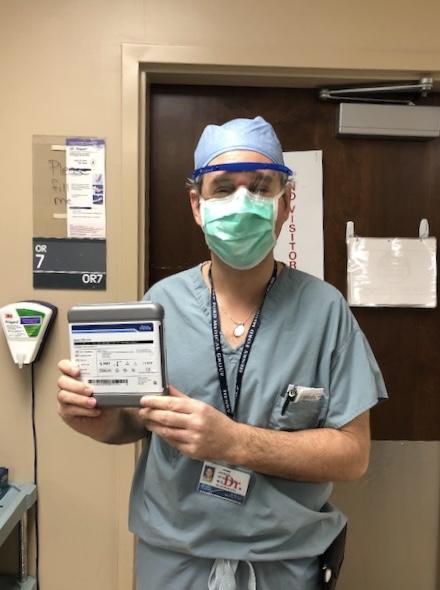
Credit: Henry Ford Health System
DETROIT (Feb. 18, 2021) – The Parkinson’s Disease and Movement Disorder Center at Henry Ford Health System was the first in the United States to offer a new FDA-approved device to help treat the symptoms of Parkinson’s disease. Neurosurgeon Jason Schwalb, M.D. surgically implanted the Vercise Genus™ Deep Brain Stimulation (DBS) System, which stimulates a targeted region of the brain through – implanted leads that are placed in the brain. The leads are powered by a device called an implantable pulse generator, which sits under the skin in the chest. The case was performed at Henry Ford West Bloomfield Hospital.
Over the past 25 years, more than 160,000 DBS systems have been surgically implanted in patients worldwide to help treat movement disorders, such as Parkinson’s Disease. The Vercise Genus DBS system, which is the fourth generation of the platform and received FDA approval in January 2021, is small and thin, and allows patients to safely undergo MRI scans, when certain conditions are met.
Parkinson’s disease is a progressive neurological condition that affects nearly one million people in the U.S. and 10 million people worldwide. It is the second most common neurodegenerative condition after Alzheimer’s disease. Most people who are diagnosed with Parkinson’s disease are aged 60 or older, and the condition more commonly affects men than women. The first line of treatment for people with Parkinson’s disease is medication, however, medication alone may not always be effective for some patients. To help improve quality of life, in some cases, physicians will consider treatments beyond medication, such as DBS.
“With neurodegenerative movement disorders like Parkinson’s disease, the ability to deliver the right dose of stimulation where it is needed can make a remarkable difference in controlling an individual patient’s symptoms,” said Dr. Schwalb. “This new Deep Brain Stimulation system has the ability to adapt therapy to address fluctuations in symptoms and the progressive nature of the condition, which allows us to control stimulation precisely and minimize unwanted side effects.”
When Vercise Genus DBS System is turned on, the implanted pulse generator sends a pre-determined program of mild electrical impulses to stimulate the brain. Unlike traditional DBS systems that are built from pacemaker technology, the Vercise Genus DBS System technology is developed from a foundation of cochlear implant technology and the precise stimulation of auditory nerves it uses to replicate hearing.
The Vercise Genus DBS System is equipped with Bluetooth® connectivity to provide enhanced communication during programming. The System’s proprietary Cartesia3D provides physicians and patients the precise control of stimulation they need to optimize therapy, and the ability to deliver the prescribed amount of therapy to target different regions of the brain, which can help address changes in symptoms during the progression of the condition.
###
To learn more or request an appointment with appointment with a Parkinson’s disease specialist at Henry Ford, visit henryford.com/ParkinsonsDisease.
About Henry Ford Health System
Founded in 1915 by Henry Ford himself, Henry Ford Health System is a non-profit, integrated health system committed to improving people’s lives through excellence in the science and art of healthcare and healing. Henry Ford Health System includes Henry Ford Medical Group, with more than 1,900 physicians and researchers practicing in more than 50 specialties at locations throughout Southeast and Central Michigan. Acute care hospitals include Henry Ford Hospital in Detroit, MI and Henry Ford Allegiance Health in Jackson, MI – both Magnet® hospitals; Henry Ford Macomb Hospital; Henry Ford West Bloomfield Hospital; and Henry Ford Wyandotte Hospital.
The largest of these is Henry Ford Hospital in Detroit, a quaternary care research and teaching hospital and Level 1 Trauma Center recognized for clinical excellence in cardiology, cardiovascular surgery, neurology, neurosurgery, and multi-organ transplants. The health system also provides comprehensive, best-in-class care for cancer at the Brigitte Harris Cancer Pavilion, and orthopedics and sports medicine at the William Clay Ford Center for Athletic Medicine – both in Detroit.
As one of the nation’s leading academic medical centers, Henry Ford Health System annually trains more than 3,000 medical students, residents, and fellows in more than 50 accredited programs, and has trained nearly 40% of the state’s physicians. Our dedication to education and research is supported by nearly $100 million in annual grants from the National Institutes of Health and other public and private foundations.
Our not-for-profit health plan, Health Alliance Plan (HAP) provides health coverage for more than 540,000 people.
Henry Ford Health System employs more than 33,000 people, including more than 1,600 physicians, more than 6,600 nurses and 5,000 allied health professionals.
Media Contact
Jeff Adkins
[email protected]
Original Source
https:/




